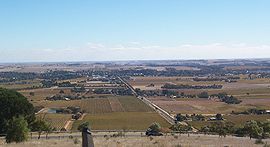Tanunda, South Australia
|
Tanunda South Australia |
|||||||||||||
|---|---|---|---|---|---|---|---|---|---|---|---|---|---|

Looking across the vineyards towards Tanunda from Mengler Hill Lookout
|
|||||||||||||
| Coordinates | 34°31′0″S 138°58′0″E / 34.51667°S 138.96667°ECoordinates: 34°31′0″S 138°58′0″E / 34.51667°S 138.96667°E | ||||||||||||
| Population | 4,153 (2006 census) | ||||||||||||
| Established | 1848 | ||||||||||||
| Postcode(s) | 5352 | ||||||||||||
| Location | 69 km (43 mi) North East of Adelaide via |
||||||||||||
| LGA(s) | Barossa Council | ||||||||||||
| State electorate(s) | Schubert | ||||||||||||
| Federal Division(s) | Barker | ||||||||||||
|
|||||||||||||
Tanunda is a town situated in the Barossa Valley region of South Australia, 70 kilometres north-east of the state capital, Adelaide. The town derives its name from an Aboriginal word meaning water hole. The town's population is approximately 4000.
The first settlement in the vicinity of what is today known as Tanunda was the village of Bethanien, settled in 1842. This village was settled by Prussian immigrants who arrived with Pastor Gotthard Fritzsche. In 1843, the village of Langmeil was established nearby by Prussian immigrants who relocated from Klemzig on the Torrens River where they had originally settled in 1838, after arriving with Pastor August Kavel. Tanunda village was settled sometime later.
The village of Langmeil was named after a village of the same name near Zullichau in Prussia, the area from which the German immigrants had originated. the original German village of Langmeil is now the Polish village of Okunin. Due to anti-German sentiments, both Langmeil and Bethanien in South Australia were renamed during the Great War to Bilyara, and Bethany respectively. Langmeil had its name reverted from Bilyara in 1975.
As development of the Tanunda area continued, the villages of Langmeil and Tanunda were joined. Today the township is simply called Tanunda.
Tanunda and the Barossa Valley comprise one of Australia's premier wine-growing areas, and the town is surrounded by vineyards. One such vineyard, Turkey Flat, is home to Shiraz vines that were planted in 1847 and are believed to be the world's oldest continually producing commercial vineyard that has been authenticated.
...
Wikipedia

